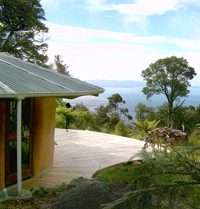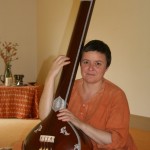by Kara-Leah Grant, Musings from the Mat
The day we arrived at Anahata Yoga Retreat, nature and God were both sodden, and the retreat was wrapped in the clouds.
I hadn’t thought to check the driving conditions before arriving at Anahata, and Samuel and I were traveling in my long, low, loaded-up station wagon.
I made it round the first muddy gravel corner and thought.
“Nope, there’s no way I’m going up there.”
There was a sense of defeat in letting the road stop me now, after I’d got the ferry over from Wellington and driven the three hours or so from Picton. But Samuel and I are moving down to Glenorchy to live with my Mum for a few months. We’ve got all our worldly possessions in the car and I didn’t want to get stuck on the side of the mountain.
Is this attachment to possessions?
Or just plain prudence?
The judge inside me screamed attachment. But Sannyasin Mangalananda shook his head when he arrived at the Grove carpark to fetch us, about half an hour later.
“You’d have bottomed out on the fords,” he said.
Prudence then.
It’s a catch-22, Anahata’s isolation from the world. It makes the retreat difficult to get to, as guests must fly to Nelson, and bus to Takaka, before being picked up and driven up the mountain. (You can also drive yourself, and if my car hadn’t bottomed out leaving my Wellington driveway, I would’ve been fine going up the mountain road).
But this remoteness is what also makes the retreat so special. The land is a mixture of farm and bush, and the views are heart-stoppingly gorgeous. Acres of land and bush meets acres of cloud and sky, over top of acres of ocean and beach.
Founded 16 years ago by husband and wife team Swami Muktidharma and Swami Karma Karuna, Anahata sits on some 30 acres of land.
There are usually around 12 residents who keep the retreat centre ticking over while receiving active yogic lifestyle training. Guests can number anywhere from a handful in winter (there was only one other guest while Samuel and I stayed) to around 20 or so people in summer. Specific retreats like Navarati also bump up the numbers.
Anahata is off the grid, using solar panels and generators for energy, and growing much of its food via permaculture. Power is precious, and only used when needed. Toilets are all composting loos.
This isn’t a luxurious retreat in the way we normally think about luxury – but it is luxurious in the best way possible. There is the luxury of space, of stillness, of presence and of acceptance.
The days here are simple, and revolve around mindfulness and service. Karma yoga is a daily practice – the act of doing with no attachment to result or outcome. It’s weeding and cooking and chopping firewood, while being present.
For many though, arriving at Anahata must be a shock.
Meals are vegetarian, and there is no choice of food. Silence is maintained from 8:30pm to 8:30am. There is of course no television, or the like. There is no cell phone service and no Internet. The days start early, with a gong half an hour before the morning practice.
Anahata is not how most of us live, and this stripping away of the inessential soon reveals our attachments.
It is easy for the mind to leap in and dance about proclaiming loudly and proudly;
‘I don’t like that, and I don’t like that, and I need some of that, and where’s that?!’
The mark of ‘spirituality’, if there is such a thing, is comfort wherever one is. Where nothing is needed, and everything is enjoyed while it is there. In revealing our discomforts, Anahata shows us our edges, the places where we’re holding tight, the things we’re using to distract ourselves, and what we’re hiding behind.
For me, the schedule and lifestyle at Anahata is familiar, and loved. I’m used to getting up every morning early, before 6am if needed. I eat vegetarian mostly, I don’t have a TV, I understand Karma Yoga. Sinking into the lifestyle here is a delight, and like coming home.
Except for one thing.
Samuel.
A toddler makes it all different. I find myself getting irritated and annoyed at his exuberance and loudness and constant demands. I find it exhausting having to look after him all day long when all I really want to do is practice asana, chant in peace, meditate, eat in silence, and be with the weeding.
In this discomfort and annoyance, lies my practice. Yes, Samuel is my practice.
He tugs at me and pushes me and goads me and at times demands:
“Where is my mother?”
I’m sitting right in front of him and wonder:
“How does he know I’ve drifted off?’
But of course he does. And he demands full presence at all times, even when I feel like I’ve got nothing left to give.
Anahata welcomes him, in all his exuberance and loudness and constant demands.
They insist he comes to the evening kirtan on our first evening. We arrive at Atma Mandir, the yurt straw bale building used for all practices, and take our places in a large circle. Samuel obediently sits and begins omming. He then looks around and demands to know;
“Why aren’t they singing Mummy?”
There is no understanding of a time for everything and everything in it’s time, not for a toddler. He speaks over Swami Muktidharma, he pokes people, he walks around and empties the box of musical instruments. He does everything that a child does – explore, question, investigate and delight.
They allow it all.
At our second Havan (ancient fire ceremony), on our second morning, I’m one of the active participants, throwing healing herbs into the fire with every round of the mantra. Samuel too has a bowl of healing herbs and becomes the fifth person around the inner circle of the Havan, making his own offering. He delights in tossing the herbs into the fire, and complains loudly when he runs out well before the 108th round of the mantra.
These small steps – allowing Samuel to be the child he is, and offering him ways to be involved that respect his age – say much about the atmosphere at Anahata.
And for me as a mother, it shows in real contrast to the way we often work with children – banishing them away from “adult” activities so they don’t interrupt and get in the way, or disturb our peace, and seeking to control them so they act the way we want them to.
In the morning meeting, where the assignments for Karma Yoga are handed out, Sannyasin Mangalananda reads:
Take everything as it comes
Take everything as it comes, instead of complaining. This means seizing every opportunity. With such an attitude, you gain a great deal of mental strength and evenness of mind. Irritability vanishes. The power of endurance and patience develop.
If you have to live amid noise, do no complain of it, but profit by it. You may make use of outer disturbances for the practice of concentration. You must develop the power to work undisturbed irrespective of who happens to be nearby. This power comes with practice and it is then useful in a variety of ways. To learn to work under different conditions indicates progress and a great deal of mental control. – Sivananda Math
This is the gift of my stay at Anahata. Something I know I’ve been working with for some time now… oh about 2 and a half years or so :-). It is still a lesson for me.
Sure, I may want to be on retreat in peace… but I can only take it as it comes.
Instead, I’m on retreat with a two foot high whirlwind that’s done battle with beetles using a blade of grass and participated at his first Havan. He’s having a great adventure, and lighting up all those who come in contact with him.
Our stay at Anahata this time around is short – only two days. But we leave to a chorus of hugs and see-you-soons.
Just as Samuel was welcomed with open arms and accepted for who he is, so too was I. In those two days, I’ve gloried in asana, kirtan and two Havans. It is such a luxury to practice with other people, and I feel a necessary shift in my state of being.
Much has been going on in my life lately, and these two days have wiped the slate clean. I leave, headed south, feeling fresh and renewed, ready for whatever the next few months may hold for me.
As we drive over the hill from Takaka to Motueka, I hear this small voice in the back start singing;
“Ommmmm… shanti, shanti, shanti, ommmmmm….. shanti, shanti, shanti,”
Ah indeed… Anahata… Peace.
Thank you to Swami Muktidharma and Swami Karma Karuna who invited me to come and stay at Anahata, and write about the experience.
Want to stay at Anahata? Here’s your options:
Come as a guest for your own private retreat. Guests are welcome to relax and recharge as they need. All guests are encouraged to participate in the daily schedule to experience the benefits of what Anahata has to offer, including a couple of hours daily of Karma Yoga (action with meditative awareness). Accommodation, all meals and programmes from $90 for the first two nights, then $75 a night. Weekly rate from $555.
Join a retreat. With a vast array of retreats running all year, there’s something to suit everyone’s level of experience and interest. From weekend retreats to month long ones, retreats at Anahata provide a broad range of yogic lifestyle tools, helping us to fine tune our awareness and intuition in daily activities. Please see website for details of up-coming retreats and prices.
Become a Yogic Lifestyle Participant and join in the day-to-day running of the centre. Through this immersion into a yogic lifestyle, we become aware of what it truly means to live simply and in-tune with the natural rhythm of nature and ‘Self’. Yogic Lifestyle Participants commit to a week’s stay and do 4 hours of Karma Yoga a day. The weekly rate is NZ$350 which includes all meals, shared accommodation and all programmes.
Stay long-term as a Karma Yogi. Anahata provides the opportunity to grow personally and spiritually so after an initial 2-4 week stay as a Yogic Lifestyle Participant, subject to availability and your skills, you may be able to stay on as a fulltime Karma Yogi. Karma Yogis practice 6 hours of karma yoga per day, 6 days a week, at a rate of NZ$175 per week (for a minimum 7 nights). This covers lodging in shared accommodation, all meals, and all daily programs. The daily routine is conducive to a Yogic Lifestyle and everyone is expected to participate in all daily activities.


Thanks Kara-Leah, beautiful and touching piece of writing of your time up at Anahata, it was nice to meet you there. Hope your move South is going well, Hari Om Tat Sat, Kat
Hey Katya,
Thank you! Yes, the move South is going well. Loving being in the mountains 🙂
KL
If we need a certain set of conditions around us to have peace, is that really peace? It’s facing difficulties without being ruffled that shows real strength of character… very difficult, which is why I’m rubbish at it. 😀
I love being remote. There’s something nice about having no phone signal, isn’t there? (or maybe I’m just weird).
Exactly… and yeah, having no phone signal is cool. A nice break!